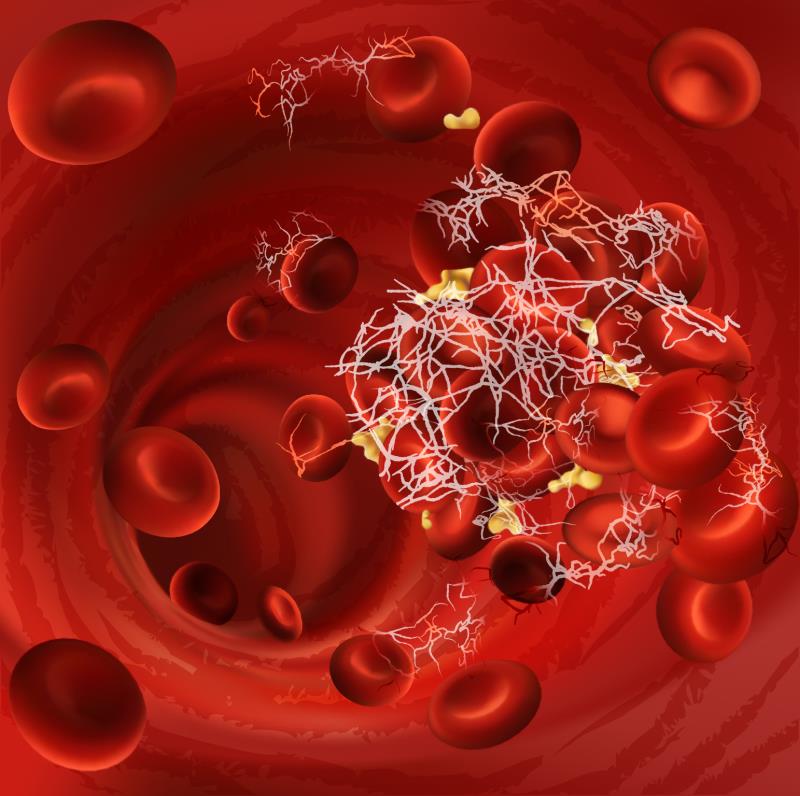Apixaban may confer survival benefit for COVID-19 inpatients





The direct oral anticoagulant (DOAC) apixaban may help prevent deaths when given at prophylactic or therapeutic doses in hospitalized COVID-19 patients with elevated D-dimer levels, according to an analysis presented during the ISTH 2020 Congress.
“Mortality in COVID-19 is associated with increases in prothrombotic parameters, particularly D-dimer levels,” pointed out lead investigator Dr Henny Billett of Montefiore Medical Center in Bronx, New York, US. “We wanted to investigate whether anticoagulation improves survival in COVID-19.”
Participants in the observational study were 3,842 COVID-19 inpatients receiving anticoagulation therapy within the initial 48 hours of hospitalization. The researchers compared the choice of anticoagulants (apixaban, enoxaparin, and heparin), given either as prophylaxis or full-on therapy, and subsequent outcome on mortality. [ISTH 2020, abstract PB/CO16]
The analysis was stratified by D-dimer levels, and adjusted for age, ventilation requirement and time period, oxygen saturation, and glomerular filtration rate.
For patients with D-dimer levels in the range of 1–3 µg/mL, even prophylactic dose of apixaban was sufficient to drive the risk of mortality down by half (adjusted odds ratio [OR], 0.43; p=0.022) compared with no anticoagulant. Apixaban given at full therapeutic dose also led to significantly lower risk of deaths (OR, 0.49; p=0.038) in these patients.
Among patients with D-dimer levels >10 µg/mL, those who received full therapy of apixaban were significantly less likely to die than those without anticoagulation therapy (OR, 0.26; p=0.009).
“Patients with COVID-19, particularly those with severe illness, benefit from D-dimer-dependent anticoagulation and that apixaban is effective in decreasing mortality in this disease,” reported Billett.
Neither unfractionated heparin nor enoxaparin was associated with reductions in mortality risk across any D-dimer levels, regardless of whether the antithrombotic agents were given at prophylactic or therapeutic doses.
Not only was there no survival benefit with these agents, the full therapeutic dose could even spell harm for patients with lower D-dimer levels. Patients with D-dimer levels <1 µg/mL who received full enoxaparin therapy had more than 10 times increase in mortality risk than those without anticoagulation therapy (OR, 14.75; p=0.012).
Further adjustment for comorbidity and D-dimer levels in the analysis model revealed that among the three anticoagulants, only apixaban prophylaxis showed significant association with a lower risk of mortality (OR, 0.52; p<0.013).
In view of the excess risk of abnormal clotting in patients with severe COVID-19 illness, the CHEST* guidelines recommend routine anticoagulant thromboprophylaxis for all hospitalized patient, unless contraindicated. This position was echoed by various international societies, including the ISTH and ACC**. [Chest 2020;doi:10.1016/j.chest.2020.05.559; J Am Coll Cardiol 2020;75:2950-2973]
According to the CHEST guidelines, LMWH*** is preferred over UFH# for thromboprophylaxis, both of which in turn are favoured when compared with a DOAC in acutely or critically ill patients with COVID-19.
Also, the standard anticoagulant dose is preferred over intermediate or full-on therapeutic dose for these patients, based on existing recommendations.